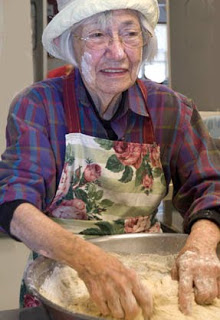I met my favorite kitchen companion decades ago, when her only son (then, my fiance) and I arrived for my initial meet-the-folks visit. As soon as we stepped inside, I could tell that supper was cooking, and it smelled wonderful. It turned out to be a simple stir-fry with ham and lots of fresh vegetables that she’d created just by adding “this and that.”
I asked if I could help, which turned out to be exactly the right thing to do, because she was a person who always pitched in with kitchen chores. I don’t recall what we talked about, just that I tossed a salad and felt at home. That evening set the tone for a whole lifetime of enjoyable hours together. We both loved to cook and happily worked side by side on literally hundreds of family holiday and vacation meals over the years.
Looking back, I think the “lebkuchen episodes,” were probably the first signs that Alzheimer’s was laying siege to our 102-pound dynamo. Mom had been preparing her traditional German fruitcake cookies (pictured below and posted here) for as long as my husband could remember. A generous tin of those iced spice drops was the only Christmas gift that he and our son ever really wanted from her. Then one year when she was about 80 she complained that the cookies were too much work, and asked if she could possibly give the fellows CDs instead. When they loudly vetoed this, she made her “lebs,” but the recipients secretly observed that the cookies didn’t taste quite right.
The following Christmas she claimed she was just too busy to prepare her lebkuchen, which really annoyed me, because she still had enough time and energy to whip up her pound cake for the church raffles, take endless covered dishes to the bereaved, and play tennis regularly! It didn’t occur to me that because the cookies required a lot of ingredients and a series of steps, they might be too complicated for her to prepare anymore.
But after that, I became the keeper of the family recipe, which delighted her, and we made her lebs together in my kitchen each year. This touchstone kept us linked and sharing, even as Alzheimer’s started taking its toll.
Soon, we all started noticing that Mom frequently misplaced and forgot things and was often confused about family plans. She worried about the lapses too, sometimes commenting that she was “headed for the funny farm.” But she was still energetic and involved in the community and, with the help of wonderfully kind, supportive neighbors, a weekly cleaning service, and a ferocious desire for independence, lived alone as she had since she was widowed at 54.
None of us realized how drastically she’d declined until the entire family gathered for a summer vacation at a rented beach house in her 85th year. She didn’t acclimate well to the unfamiliar environment, and at every meal, when she insisted on helping by setting the table, she usually had to be pointed to the silverware drawer. It was also funny, yet heartbreaking, to see her settings—a hodgepodge of some flatware and dishes duplicated, other pieces missing, and, almost inevitably, fewer places than she was supposed to set.
She’d always been driven to do her fair share in the kitchen, but now, even though cooking chores were clearly challenging and she’d forgotten many of her recipes, she was absolutely adamant about participating in every activity with me. In fact, this helped us keep us close and functioning as a team. I did my best to accommodate by assigning her prepping tasks like peeling cucumbers, washing lettuce, and cutting up fruit. Since I could see that she struggled with verbal instructions, if I wanted particular sizes and shapes, I laid out samples she could use as guides. This worked well, although at times she recognized her limitations and would plaintively say,” I know I’m not who I used to be.” Which was both profound and painfully true.
We were all particularly shocked when Mom tried to treat us to some fresh local shrimp she’d bought three days before the rest of us arrived. The problem wasn’t that she’d forgotten them in the refrigerator. She’d forgotten what she—and everybody who grows up six miles from the Atlantic ocean—had known from about age 10: Fresh, raw shrimp must be cooked right away. The clincher—she resisted throwing the smelly package away!
The family had planned that when my mother-in-law could no longer live alone she would move into the assisted living facility my husband’s sister helped run. Even Mom realized, unhappily, that the time had come, and soon she was settled in her own apartment and doted on by an attentive staff, including her own daughter. She kept busy by working in the kitchen (often mixing up bread as shown in the pic above) and garden and folding all the napkins each day. The only problem: She’d moved from the coastal Carolina town where she’d spent her whole life to a city four hours inland. She might as well have been on the moon, and never adjusted to the change.
By the next summer, Mom often labored to find words and express thoughts, had serious short-term memory loss, and struggled with balance and coordination. When she toted serving bowls to the table they listed precariously. When she wanted to sweep the floor, she requested “the thing with a stick that you clean with.” In truth, it would have been easier to discourage her from “helping,” but with so many of our shared activities like chatting, Scrabble playing, and taking walks together diminishing or past, kitchen chores were a vital tether still connecting us. And so we carried on, as best we could.
At some point I asked her to fix one of our favorite side dishes, her vinegar and oil slaw. I realized she probably wouldn’t recall the recipe, but hoped to rekindle some faint, soothing embers of memory if we readied it together. “Remember, you usually add celery and mustard seed, and some prepared mustard, and chopped fresh chives….” I prattled on cheerfully as I mixed the dressing I’d seen her make so many times. She merely stood and looked skeptical. Finally she shrugged and said with exasperation, “I never put all that stuff in there.” “Okay,” I countered, “then I guess it’s my slaw inspired by yours.” This seemed to satisfy her.
Thankfully, I can find the deep joy buried within this woeful tale. Through many pleasant kitchen hours over many gratifying years, Mom and I bonded in a way that is rare for mothers and daughters-in-law. And it lasted even as her disease was wresting her away. She was enormously proud of my culinary accomplishments (I’m sure her friends tired of her endlessly talking up my cookbooks), and she told me she loved me like a daughter. I’m certain that she did, and it helped make up for the loss of my own dear mother when I was only 25.
It also comforts me to prepare Mom’s dishes. I made a batch of her holiday lebkuchen several days ago, and I know she was pleased and right there by my side. She’ll also be thrilled that I’m passing the recipe on to my son and grandchildren. Every time the distinctive aroma of those drops wafts from the kitchen, they’ll think of her.



It was cathartic to write–yes wonderful and terrible memories all in there. Roc and David have always loved her lebs; I like them, too, though I wonder if anybody will make them after I’m gone. Maybe I’ll try to teach Lizzie and Charlie. Thanks for your comments.
Just saw this today–it’s a wonderful tribute to my favorite aunt! I must admit that I was never too fond of the lebkuchen (don’t like candied fruit), but I remember as a boy trying to eat around the fruit pieces–the “cookie” part was really good. Thanks for bringing back many happy memories, along with sad ones about her illness and mother’s and Wayne’s.
Thanks to all for your kind comments.
GG will be special to all of us forever.I was so thankful when I received a little box of 6 of her cookies one year. Thankfully the kids were too young to appreciate them so I didn't have to share.
Thank you for writing such a tribute to someone we were all blessed to know. Sally
G.G. was a wonderful person. I'm so glad that I got to know her and am proud to call her my "adopted" Grandmother! Thank you for writing such a thought provoking article.
Just beautifully said. The past is not prologue. The past is always in the present, even in the kitchen. As Toni Morrison puts it in BELOVED, "Time. It's just so hard for me to believe in it anymore."
It's sad and sweet and makes me think about what my mom is going through–who also has dementia and is now in a nursing home. She was such a good cook as your mother-in-law was. Nice to have the warm memories. Thanks for sharing your throughts.
It made me cry when I was writing it, too, especially when I talked about her forgetting our favorite slaw recipe. But it also helped me to write the story, because it reminded me of the years of good times we shared.
Oh, Nancy, this makes me cry. We're going through a lot of this with my mother right now–trying to find her kitchen tasks she can do since she wants to be in the kitchen helping just as your mother in law did. It's dear and sad at the same time. You have my sympathy; enjoy your happiest memories of her!